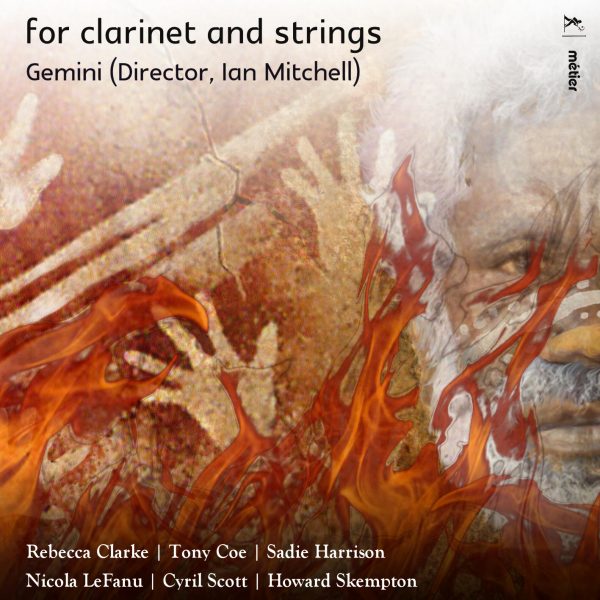Fanfare
Gemini is a British new music chamber ensemble, founded in 1978. The premise of this disc is music for clarinet and strings, but it is not entirely music where the clarinet is a soloist. Ian Mitchell, the excellent clarinetist on this album as well as Gemini’s director, explains in his introductory note that in many of the pieces the clarinet is simply part of an ensemble, though it does play a more traditional solo role in Cyril Scott’s quintet and Tony Coe’s Dream Odyssey for clarinet and string quartet. The program is a very well-chosen collection of music from the 20th and 21st centuries. Except for Sadie Harrison, who is Australian, the composers are all British.
Cyril Scott (1879-1970) composed his Clarinet Quintet in 1951 and revised it two years later. The recording here (made in 1995 but released now for the first time) may well be its only performance aside from a BBC broadcast from 1982. The piece is in one continuous movement with numerous tempo changes, and the clarinet is truly integrated into the texture of the string quartet. The excellent program notes say that this piece was inspired by Scott hearing the great British clarinetist Gervase de Peyer perform Brahms’s Clarinet Quintet, and the music shares some of the autumnal mood of that work. But what is most striking about Scott’s piece is the wide range of colors and textures that he draws from five instruments. This is a lovely, rhapsodic work that would be welcome on any chamber music concert.
Songs without Words by Nicola LeFanu (b. 1947), unlike Scott’s quintet, puts the spotlight on the clarinet. The first of the four songs is for solo clarinet, which is joined by a string trio (violin, viola, cello) in the other songs. Lyricism strikes me as an important feature of this music, which is appropriate from the title. The last of the four songs is the longest (almost half the length of the entire 11-minute piece). Titled “Remembrance,” it is intended as a memorial to those who have died in the violence of the Middle East. Its melancholy mood is very touching and lovely.
Lullaby by Howard Skempton (b. 1947) is scored for clarinet and cello. The cello intones a theme that recalls Bach’s unaccompanied cello suites before the clarinet enters with its own lyrical contrapuntal line. Lullaby is a hauntingly beautiful four-minute work. Skempton’s Gemini Dances, which conclude the disc, are scored for flute, clarinet, violin, cello, percussion, and piano. Skempton is a miniaturist; the longest of these seven dances is only two minutes long. He has a real melodic gift, though not necessarily the ability to develop a melody. These dances work because of his imagination for different sonorities.
Tony Coe (b. 1934) is a jazz saxophonist and clarinetist as well as a composer. Dream Odyssey demonstrates little of his jazz background, however, and left little impression with me. Even over its brief five-minute duration I found it meandering and unable to retain my attention.
On the other hand, Prelude, Allegro, and Pastorale by Rebecca Clarke (1886-1979), which is scored for clarinet and viola, is music of real stature. The two instruments are treated with equal importance, and like so much of Clarke’s music it has a way of grabbing and holding your attention. What makes some music sound truly important isn’t easy to describe, but the more I encounter anything of Clarke’s, it becomes clearer to me that she was one of England’s important composers. Everything she writes has presence; her melodies captivate your attention and stay with you. Here, the Allegro communicates a vivid spirit through its rhythmic vitality, and the final Pastorale, the longest of the three movements, is hauntingly lovely.
Harrison’s Fire in Song reflects her Australian heritage. She was born in 1965, and this is the most recent work on the disc, being composed in 2020. It is scored for clarinet, viola, and two clap- stick-playing narrators. In her program notes Harrison says that “the work was written during the catastrophic bush fires that swept much of Australia in 2019-2020 and reflects on the Aboriginal approach to these fires.” The use of the Aboriginal clapsticks is meant to evoke the insects and birds of the Australian outback. The story of fire’s creation in Aboriginal folklore is recited by the percussionists to the pulse of the clapsticks. The composer’s notes provide a fairly literal roadmap to Fire in Song’s seven movements, but for any piece of music to work, it must stand on its own, and this one does. I enjoyed its vital rhythmic pulse and brilliant colors before I read the notes, and I never did try to follow the details too closely. Several of the recordings on this disc date from 1995, when Gemini performed them but didn’t find a label on which to release them. One hears no difference in recorded sound between them and the new repertoire on the disc, despite the 25-year hiatus. Gemini is a superb ensemble, and Ian Mitchell’s clarinet playing is highly imaginative and beautiful. Warmly recommended.
@divineartrecordingsgroup
A First Inversion Company
Registered Office:
176-178 Pontefract Road, Cudworth, Barnsley S72 8BE
+44 1226 596703
Fort Worth, TX 76110
+1.682.233.4978












